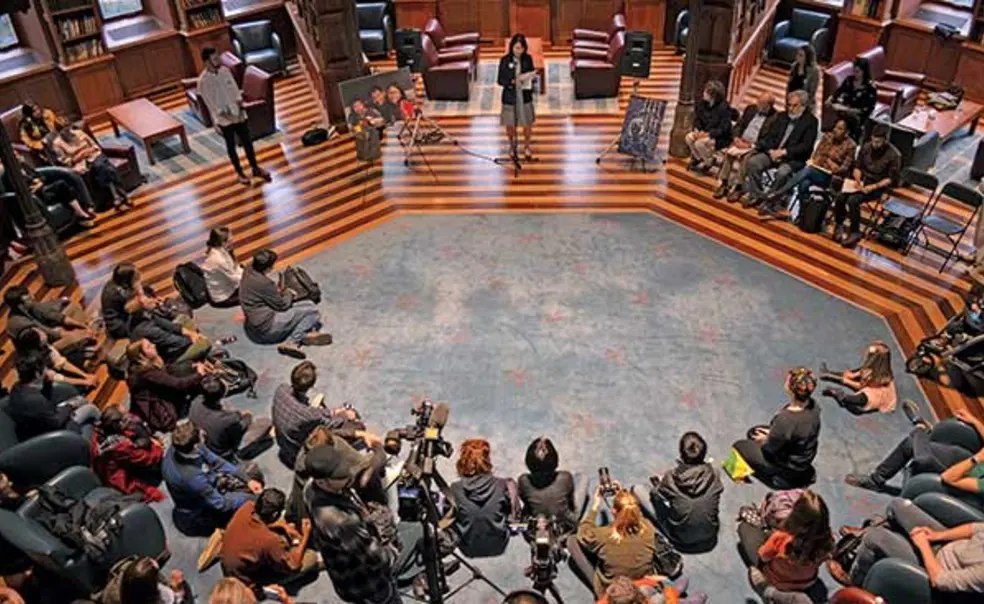Vigil Supports Imprisoned Grad Student, Promotes Safety and Freedom for Scholars
The hooding ceremony on Cannon Green last spring was a time to recognize the University’s advanced-degree recipients, but Graduate School Dean Sarah-Jane Leslie *07 made note of one student who was missing that day: Xiyue Wang. Wang remained in Iran’s Evin Prison.
Wang’s imprisonment passed the three-year mark in August. Wang, who had traveled to Iran for his doctoral research, was convicted in Iranian courts on sham charges of espionage. The United Nations has called for his release and stated that his arbitrary detention is a “clear violation” of international law.
Most of those who entered the Graduate School with him have completed their degrees, but other grad students are ensuring that his story is told. Their group, Free Xiyue Wang, conducts advocacy, outreach, and a public campaign for his release. The group’s president, history Ph.D. student Michael McGovern, had never formally met Wang. Third-year history student Hannah Stamler, who runs the group’s social-media accounts, was never on campus with Wang.
In October, the group held a vigil. They sent invitations to professors to speak, posted flyers, staffed tables in Frist Campus Center, and emailed listservs. The event had a particular focus — “really claiming [Wang] for Princeton,” McGovern said.
“We want to make sure that the broader community — faculty, staff, students, anyone who interacts with the University — remembers this,” Stamler added. The group asked speakers to address a theme they believed to be universal in the University community: “promoting scholarly safety and scholarly freedom.”
McGovern said research is “a shared collective value” of graduate students and undergraduates that could bring the two groups together to support Wang’s cause. Anyone at the University “might at some point in their career find themselves in a project that takes them to a place that might put them at risk,” he said.
Dozens of community members gathered in Chancellor Green Library that October afternoon.
“The voices of scholars are united in their support of Xiyue and the intellectual values that he embodies.”
— Hua Qu, wife of Xiyue Wang
In her opening remarks, Wang’s wife, Hua Qu, explained how her husband’s research acumen and language skills make him an especially capable scholar. Wang’s research focused on Inter-Asia, a region that lies between Iran and China. Archival research is essential for him, she said: “Xiyue has an insatiable drive to know something in a very meaningful way that wasn’t known before.”
“The voices of scholars are united in their support of Xiyue and the intellectual values that he embodies,” Qu said. But scholars “need the support of everyone who still believes that learning and cultural exchange still have a place in our world today.”
Professor Molly Greene, who taught Wang in a class on the Ottoman Empire, said Wang’s case represents the growing threat to scholarship worldwide posed by curtailing freedom of movement. While more foreign students are being denied access to U.S. student visas, scholars are struggling to get visas to travel for lectures and conferences, she said. “His problem’s our problem, and Princeton’s problem, too.”
The importance of archival research to academic freedom and discovery was highlighted by Professor Anthony Grafton. “History is made in archives,” he said. “Historians are made in archives, too.”
At the vigil’s end, two of Wang’s friends in the Graduate School read aloud Wang’s own writings from Evin Prison. Beginning with some French phrases, and interspersed with Persian phrases, Wang’s words filled the rotunda.
His dream, Wang said through his friends, had been to study the part of the world where he pursued his research, “to unveil its historical mysteries.” He learned Persian and journeyed “in sincere goodwill.” But instead, he was unjustly convicted and now languishes an ocean away from his wife and young child. “For the Iranian authorities,” he said, “I don’t matter in my story.”












No responses yet